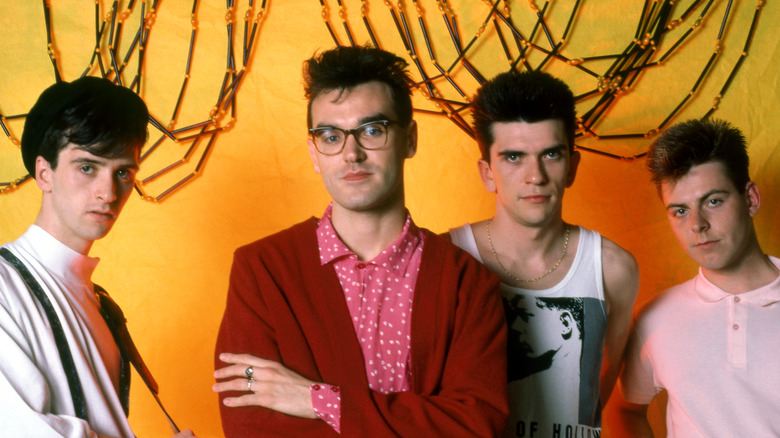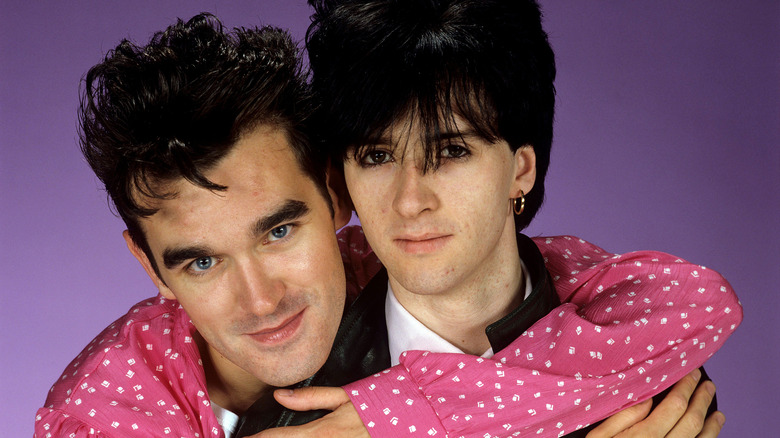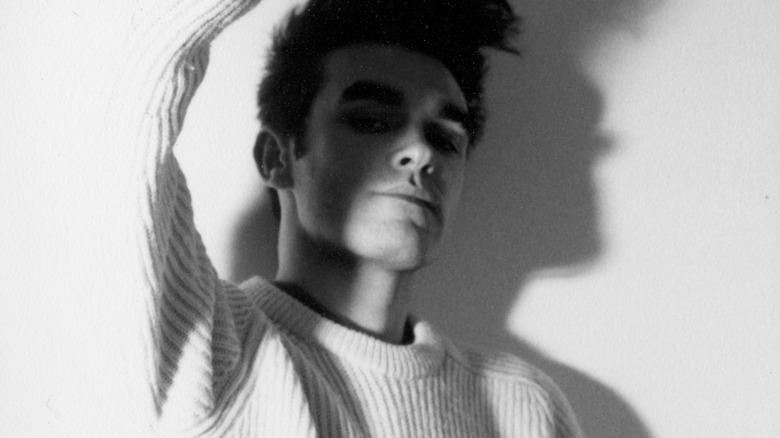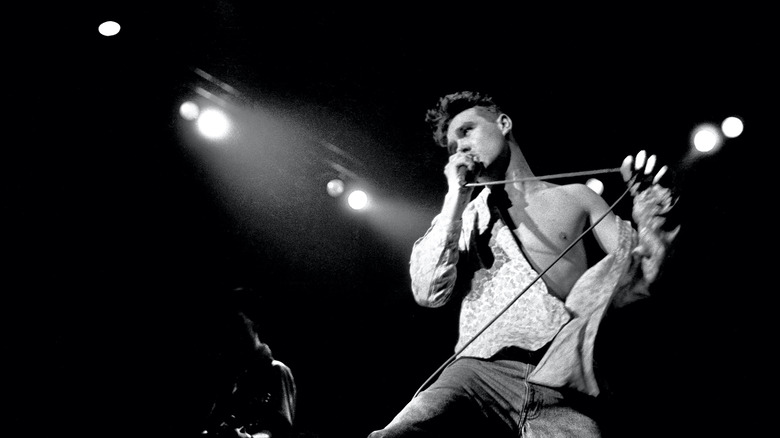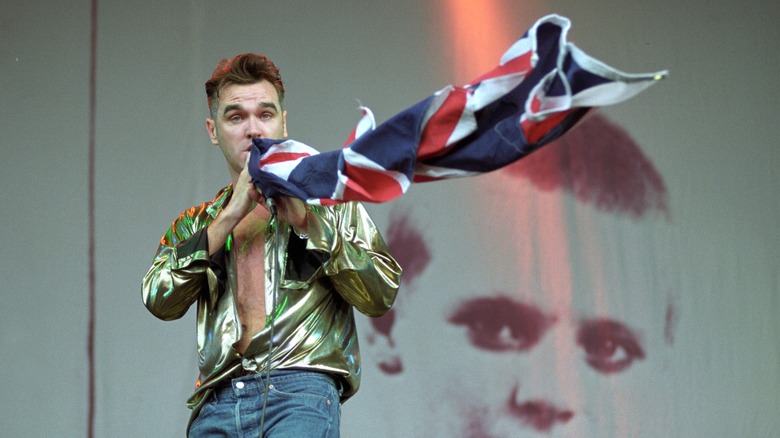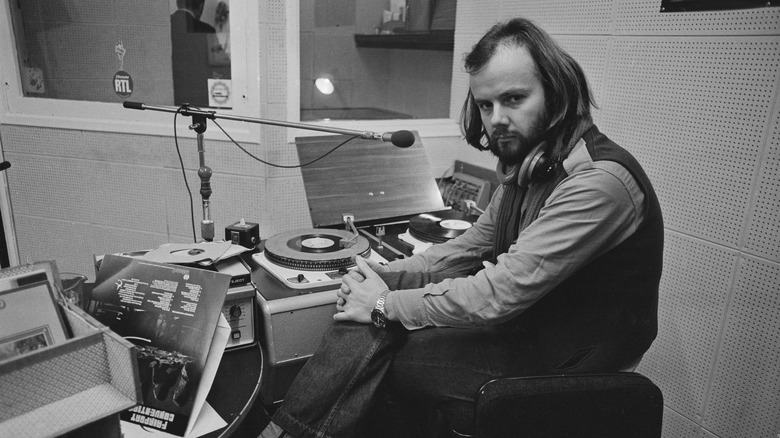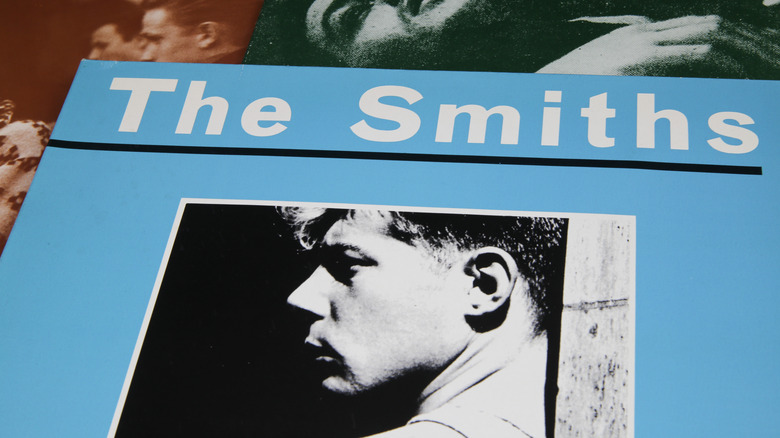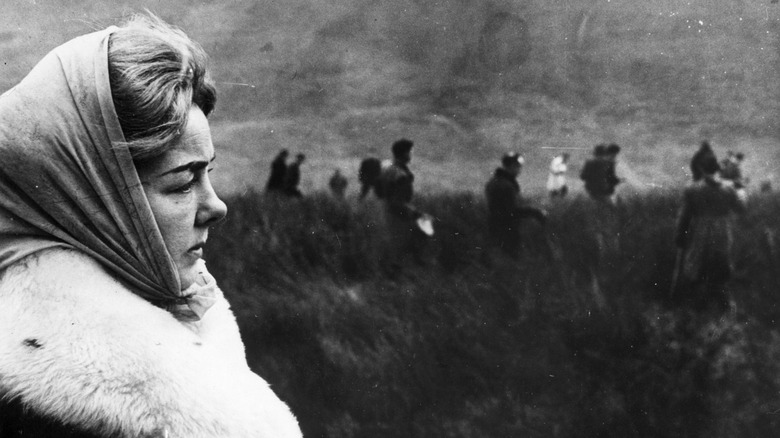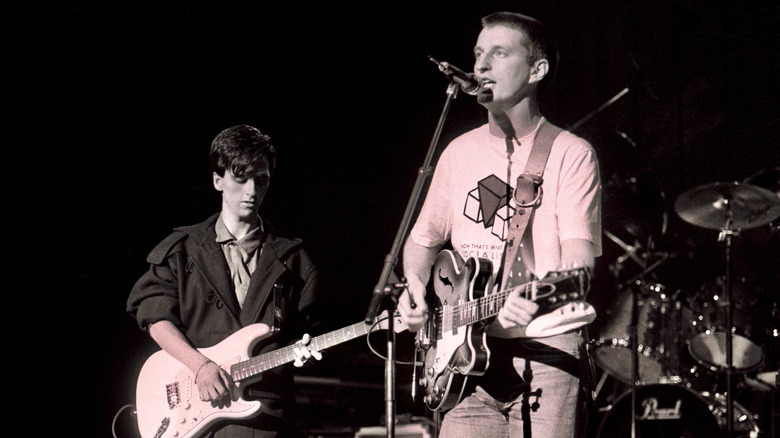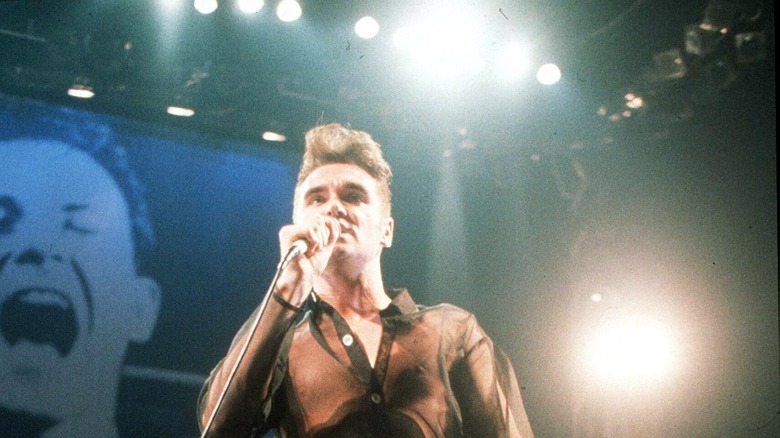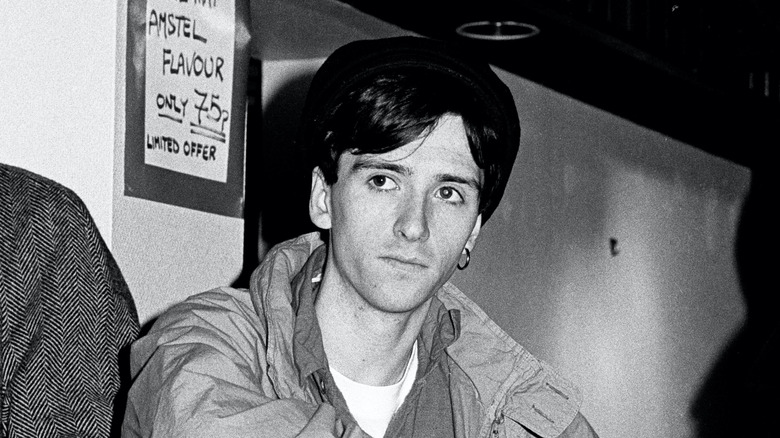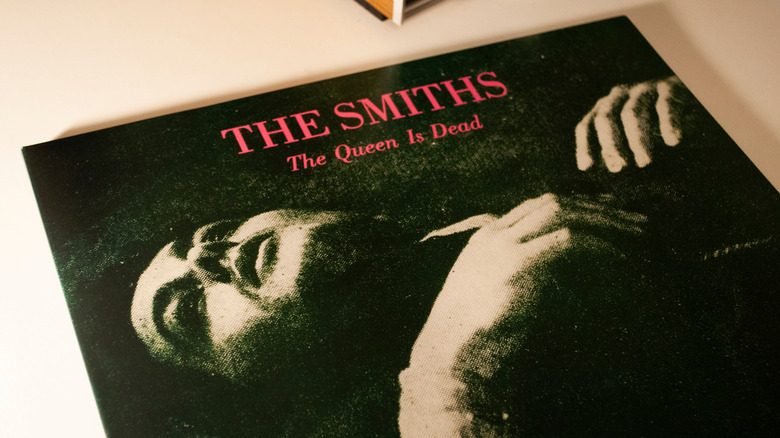The Untold Truth Of The Smiths
When the Smiths sauntered onto the scene in the early 1980s, the English rock band made a statement through understatement. While the pop music of the time was saturated in big hair, big shoulders, synthetic sounds, and general melodrama, two extraordinary men from Manchester — Stephen Morrissey and Johnny Marr — united in their ordinariness. The result was a band that looked almost defiantly normal, sounded both miserable and heavenly, and captured the disillusionment of a generation.
In just five years, the Smiths saw a string of controversies, often stoked by conservative conformists and the tabloid media. Helmed by Morrissey, the band rode into stardom on a wave of strong opinions and dark yet truthful lyrics. But it's this darkness, truth, and gentle strength that gave voice to the silence of so many and solidified the short-lived band's place in cultural consciousness. Here's more on the morose charms of one of the most important indie bands of the 1980s.
Johnny Marr and Morrissey met at a Patti Smith show
Despite reports that Steven Morrissey and Johnny Marr met in 1982, Morrissey confirmed in an interview for the Irish Times that the pair had in fact met in 1979, at a Patti Smith concert. "I thought [Smith's first album, 'Horses'] was extraordinary because it was the voice of somebody who perhaps had felt unattractive all their lives, in every way," Morrissey told The Telegraph in 2011. "Yet here they were, singing about it, and seemed to know a way to make the misfortune of their lives become attractive."
When Morrissey and Marr met, the former was 20 and the latter was 16. In addition to their shared love of Smith, the pair bonded over their affinity for bands including The New York Dolls — whom Morrissey published a book about in 1981 — and The Velvet Underground, per Time. Their similar "quiff" hairstyles also showcased their rockabilly connection. Both were active members of the punk rock scene in Manchester, England, when they met. Even so, Morrissey later told the Irish Times that he "did not like [Marr] then, we were continents apart." Despite Morrissey's distrustful nature, his musical connection with Marr bloomed into one of the most influential bands of the 1980s.
Morrissey chose the Smiths' name because it was 'ordinary'
In a 1984 interview on the kids' television show "Data Run," a child in the audience asked Morrissey and Johnny Marr why they chose the band name the Smiths. "We're called the Smiths because you [pointing to Morrissey] decided we were called the Smiths," Marr said, and Morrissey added, "And I decided because it was the most ordinary name, and I thought it's time that the ordinary folk of the world showed their faces." Morrissey then pointed at Marr's face and his own.
Morrissey later contradicted his suggestion that he was ordinary. During a 1985 interview for Melody Maker, he described himself as "extraordinary" and said that so many ordinary people connect with his music "because everybody's extraordinary and the minority of people in this world are very ordinary," as quoted in Mark Simpson's 2006 biography "Saint Morrissey."
"I hate ordinary people," Morrissey said in an interview with Inrockuptibles, as quoted in David Bret's 2004 book "Morrissey: Scandal and Passion," adding, "I was a strange child who couldn't function in ordinary society. It's easier to fall in love with images and myths."
The Smiths' early lyrics and visuals sparked speculation about Morrissey's sexuality
Morrissey's sexuality has been the subject of debate since the Smiths' formation. Although he is famously celibate, the frontman's more suggestive early lyrics sparked speculation that he was gay. In "Handsome Devil," from the band's second demo, Morrissey proclaims, "A boy in the bush/Is worth two in the hand" (via Genius).The cover of the Smiths' eponymous debut album features a cropped still of Joe Dallesandro as a gay male prostitute in the Andy Warhol-produced 1968 movie "Flesh."
In a Gay Times article titled "The God That Failed," Richard Smith hypothesized that Morrissey drifted away from queer themes once the Smiths found stratospheric success. "Once it became clear that the Smiths were destined not for the originally intended indie cultdom, but for stardom, a large lyrical retreat and rethink was swiftly undertaken," Smith wrote, as quoted in David Bret's "Morrissey: Scandal and Passion," adding, "None-the-less, whilst his songs then became non-gender specific to a man, they still only stood up to a homosexual reading ... Like anyone reasonably well-raised in gay culture, I could pick up the references, allusions, and signs ... The message couldn't have been any clearer if he'd put Jeff Stryker or Judy Garland on them."
In his 2013 autobiography, Morrissey wrote about having a serious relationship with a man. "Unfortunately, I am not homosexual," he subsequently wrote in a note posted on fansite True to You (via The Guardian). "In technical fact, I am humasexual. I am attracted to humans. But, of course, not many."
The Smiths formed their sound as a rejection of the popular music cliches of the time
"Burn down the disco/Hang the blessed DJ/Because the music that they constantly play/It says nothing to me about my life," Morrissey sings on the Smiths' "Panic" (via Genius). When the Smiths were getting started in the early 1980s, the music that was constantly played on popular radio was dance music infused with synthetic sounds.
"The reason why Morrissey and I got together in the first place to write songs — and the reason why it was so successful — was because we both felt the need to react against what we'd been hearing over the past X years," Johnny Marr told The Guardian in 2011. "Even our name ties in with it. We're really sick of all this dressing up in designer clothes and having your hair done by whatever hairdresser is in vogue."
Morrissey mimicked Marr's distaste. "Nothing spurs you on like anger and we were angry about all the ugly people who control this business and all the ugly faces on Top of the Pops," he told The Guardian. Why all the ugliness? It's very strange — this complete lack of intellect and complete lack of sensitivity. And of course there was nothing more repellent than the synthesizer, so it was really time to sweep all that down the drain."
DJ John Peel helped launch the Smiths' career
In 1983, the Smiths played their landmark "Peel Sessions" for influential DJ John Peel's show on BBC Radio 1. The songs that sprang from these sessions became the band's 1984 compilation album, "Hatful of Hollow," per BBC. The sessions also introduced the Smiths to a wider audience than ever before. The band's record label, Rough Trade, decided to release "This Charming Man" as a single in place of the previously selected "Reel Around the Fountain" due to the positive audience response to the Peel session recording of the former song.
Guitarist Johnny Marr wrote "This Charming Man" the same night he wrote "Pretty Girls Make Graves" and "Still Ill," per Songfacts. "'This Charming Man' ... was written because we had a John Peel session and we didn't have enough songs," Johnny Marr recalled (via BBC). "The session was on a Friday, and on the Tuesday I just got out of bed and wrote this tune because we needed another song for the session."
The Smiths were accused of pedophilia by a British politician and tabloid reports
In the fall of 1983, the Smiths received major press coverage of the negative variety when conservative politician Geoffrey Dickens alleged that the band's song "Handsome Devil" was about assaulting children, as reported in the New Musical Express. Dickens' allegations were reported in the British tabloid The Sun, and spread like wildfire through other media outlets and into the band's own communities. "I don't even like children," Morrissey said in response to the allegations. "'Handsome Devil' is entirely directed towards adults."
The band's lawyers threatened the offending news outlets with lawsuits if retractions and apologies were not issued, as reported by Melody Maker (via Tip Top Website). Johnny Marr told the New Musical Express that the allegations brought his younger brother, who was 11 years old at the time, heightened attention at school from pupils and teachers alike. "It seems on the surface of it as the obvious hatchet job against a new, rising band who are getting a certain amount of publicity," he said. "But on every level the whole thing's got completely out of hand ... and it's affecting us personally now."
"It's really their affair and we're just bait," Morrissey said, in reference to Dickens' opinion and the media scrutiny. "It's all really a total travesty of human nature that it's thrown at us, such sensitive and relatively restrained people. I live a life that befits a priest virtually and to be splashed about as a child molester ... it's just unutterable."
The Smiths sparked outrage for alluding to the Moors murders in 'Suffer Little Children'
The Smiths' 1984 song, "Suffer Little Children," referenced the horrific Moors murders that took place in Manchester, England, in the mid-1960s. The subject matter sparked a roaring controversy, which Morrissey told Melody Maker he had anticipated but was not ready for. "I was quite confused," he said (via Illness as Art). "Nobody would actually let me comment on it. It appeared in national newspapers the length and breadth of the country – Morrissey does this and Morrissey says that and Morrissey believes... and nobody asked me a thing. Nobody knew what I believed or why the lyrics were there. So that was the only distressing element. But I'm glad the record got attention, ultimately."
Morrissey later argued that calling out evils is the only way to end them. "Veiling the Moors Murders is wrong," he told Spin in 1986 (via Forever Ill). "We must bring it to the fore. If we don't overstate things, they'll continue to happen. We don't forget the atrocities of Hitler, do we?"
One fact that was conveniently omitted from the media reports was that Morrissey had actually grown close to the mother of Lesley Ann Downey, one of the murder victims that he name-checked in the song. "In the north, I was painted as a hideous Satanic monster, and the word was that I had upset Ann West [Downey's mother]," he told Spin. "In fact, I had not, and have since become great friends with her. She is a formidable figure."
Members of the Smiths adopted Morrissey's firm stance against eating animals
The Smiths' sophomore album, "Meat is Murder," made a clear statement regarding Morrissey's stance on eating animals. The other three members of the band who were attached to the album were then expected to uphold the philosophy of its title. "You can't record an album called 'Meat Is Murder' and slip out for a burger," bassist Andy Rourke told Uncut in 2015. He went on to recall his switch to vegetarianism after he ordered a full English breakfast with bacon and sausages and his disgusted bandmates left the table one by one.
"I see no difference between eating animals and pedophilia," Morrissey wrote in a statement published on his fansite in 2014 (via The Guardian). "They are both rape, violence, murder. If I'm introduced to anyone who eats beings, I walk away ... Imagine, for example, if you were in a nightclub and someone said to you: 'Hello, I enjoy bloodshed, throat-slitting and the destruction of life,' well, I doubt if you'd want to exchange phone numbers."
Morrissey elaborated on his stance in a 2018 interview published on Tremr. "[Many people] assume you've adopted the moral high ground by refusing to eat a dead animal," he said. "And they're right! But you only take the stand on behalf of the butchered animal — you don't make money from your point of view. You become the voice of the animal ... who kicked and struggled to hang on to life."
The Smiths' final concert was an anti-apartheid benefit
The Smiths concluded the Queen is Dead tour on October 30, 1986. But to the surprise and delight of fans, the band announced an additional show as a benefit for Artists Against Apartheid two weeks later, per Radio X. After Johnny Marr crashed his car in a nearly fatal accident, the show was postponed from its original November 14 date to December 12.
Other than a handful of recorded performances for television and radio, the benefit show would turn out to be the Smiths' final concert as a band. Onstage at Brixton Academy in London, they played a set that included rare and new gems like "Some Girls are Bigger Than Others" and "Shoplifters of the World Unite," per Rolling Stone. Although fans did not know at the time that it would be the Smiths' final show, the band closed the set with a clear message through their debut single, "Hand in Glove," the last lyric of which is "I'll probably never see you again" (via Genius).
Johnny Marr struggled to manage the band in its later days
By the late 1980s, the previously strong alliance between Johnny Marr and Morrissey was weakened by their differences. According to Rolling Stone, Morrissey found any manager the band brought in unbearable. This often left Marr — who already had his hands full writing and playing the band's music — negotiating contracts, organizing tours, and taking care of nitty-gritty details like transportation, per the Independent.
"New allegiances were formed between band members and I was having to defend the merits of our new manager," Marr wrote in his autobiography, "Set the Boy Free." "I didn't understand why there was a problem. The band's business was finally being looked after ... But the rest of the band made a sudden U-turn and it was three against one. I could feel the positivity I had for the future slip away."
The pair also disagreed on their musical influences, as Morrissey wanted to cover forgotten '60s pop stars rather than exploring the music Marr found new and exciting. And, while Morrissey was living his priestlike lifestyle, Marr was engrossed in cocaine and brandy, per the Independent. On August 1, 1987, the NME published an article that prematurely announced the band were breaking up. Morrissey and Marr were each sure the other one had leaked the story. On September 28 — the release date of the band's fourth album, "Strangeways, Here We Come" — Rough Trade announced that, after five years in the limelight, the Smiths were no more.
Morrissey called post-Smiths legal disputes 'a potted history' of the band
Once the Smiths' accounts were finalized post-split, drummer Mike Joyce launched a lawsuit over his share of earnings. As the band's co-founders and co-songwriters, Morrissey and Johnny Marr were delegated 40 percent of the band's earnings each, while Joyce and bassist Andy Rourke each earned 10 percent, as reported by The Vibe (via Morrissey Solo). The suits dragged on for seven years, and ended in Morrissey and Marr paying settlements to their former band members, per the Manchester Evening News (via Morrissey Solo).
"I thought it was shocking, and if I was a weaker person or less intelligent, it would make me despise the Smiths and everything they stood for," Morrissey told Melody Maker in 1997. "The court case was a potted history of the life of the Smiths. Mike, talking constantly and saying nothing. Andy, unable to remember his own name. Johnny, trying to please everyone and consequently pleasing no one. And Morrissey under the scorching spotlight in the dock being drilled. 'How dare you be successful?' 'How dare you move on?' To me, the Smiths were a beautiful thing and Johnny left it, and Mike has destroyed it."
The former Smiths have repeatedly declined to reunite
"I would rather eat my own testicles than reform the Smiths," Morrissey told Uncut in 2006 (via Gigwise), "and that's saying something for a vegetarian." This statement came after he reportedly turned down a £5 million offer to reunite at Coachella.
Then, during a 2009 interview for Xfm's "Razor Cuts," Johnny Marr revealed the Coachella offer wasn't the first time the former band had been offered a whopping amount of money to reunite on stage. "I think we were offered 50 million dollars for three... possibly five shows," he recalled. "It's pretty obscene, it's pretty gross."
Morrissey addressed the impossibility of a reunion in his self-titled 2014 autobiography. "Yes, time can heal," he wrote. "But it can also disfigure. And surviving the Smiths is not something that should be attempted twice. If the Smiths split was designed to kill me off, then it failed. If the Smiths court cast was a second attempt to kill me off, it too must fail. There is another world, there is a better world; well, there must be, and even if the passing of time might mellow you into forgiveness, it doesn't mean that you ever want to be friends."
Bassist Andy Rourke passed away of pancreatic cancer May 2023, also effectively ending any possibility of a classic line-up reunion.
